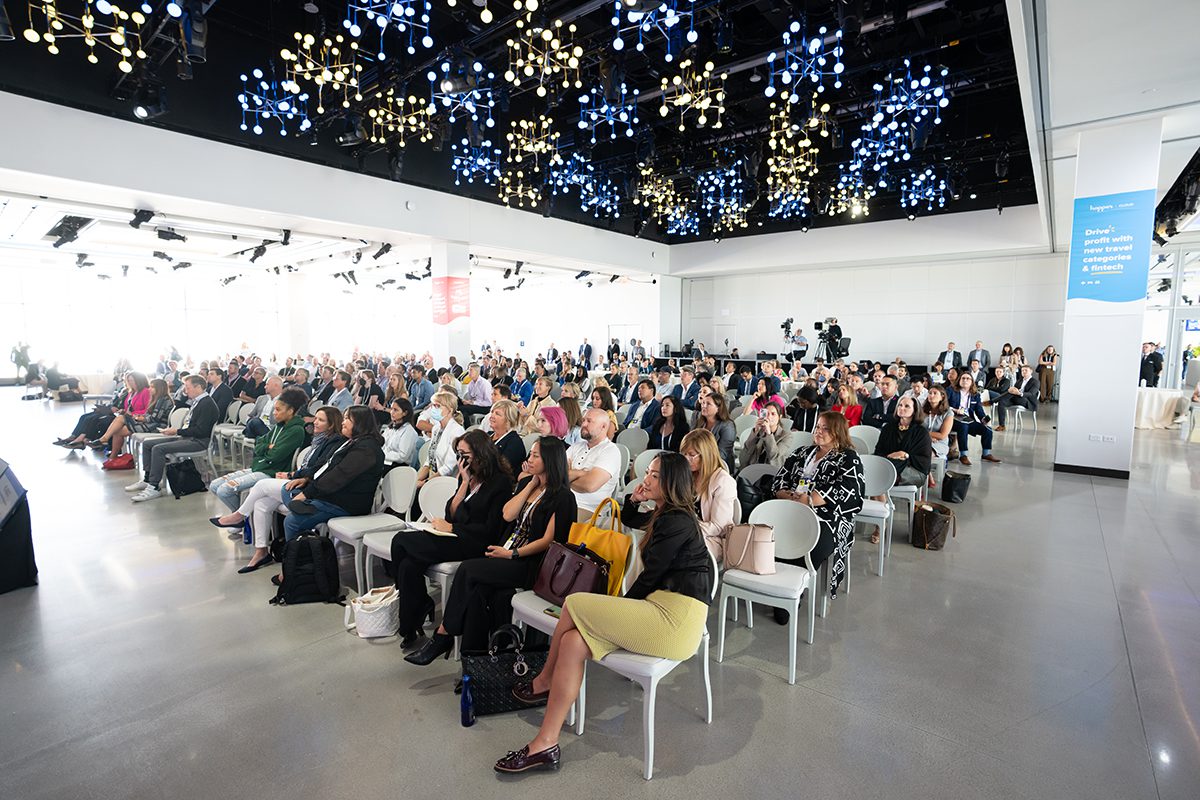Skift Take
Two information-packed days in New York City, hundreds of ideas. Here's the lowdown on three sub-themes that caught our eye.
Industry leaders took to the stage in New York City for Skift Global Forum this week, sharing their views on travel and discussing new trends.
On the agenda, candid conversations with CEOs on how their businesses were performing coming out of the pandemic, plenty of discourse on the growth in blended trips and the future of work, and smart commentary on grappling with the ongoing labor crisis.
But among the industry soundbites that 700-plus in-person attendees heard from the main stage and 800 more online, a few alternative themes emerged as well, from the psychology of marketing to how to manage a business. Here’s a wrap-up.
Just Make It Up as You Go
Frederic Lalonde, the energetic CEO of Hopper, revealed how he likes to build new products. The secret is to be bold and experiment — even if that means making a loss. When asked which of its products were losing “a ton of money,” he replied it was anything new they try. “It blows up in our face yearly,” he said.
But some features that get tested for a year can prove to be hits — like its new hotel cancellation policy.
“The trick is you test it with a small group. You spend a lot of money on a few people. You figure out what you did well, then you scale. If you do it the other way around, that’s bad,” Lalonde told the audience. “We have this sub-group of users that engage with us. We’re testing and trying to figure things out. It’s so wild, I don’t actually understand what we’re doing here.”
Lalonde, who’s also co-founder of the startup, said a recent flash sale took him by surprise. It sold “loot boxes” — treasure chests with a mystery gift, such as a voucher — for between $3 and $14, as part of a Puerto Rico promotion.
“We sold more loot boxes than flights on that day,” he said. “People were coming to me with this data, and I was saying ‘that’s wrong, that’s not possible.'”
Find out what else Lalonde had to say here.
Getting Into the Minds of Guests
Coming out of the pandemic, online marketing continues to be a hot topic. Performance marketing was even described as a drug by Airbnb CEO Brian Chesky. But one speaker wants to rip up the rule book. For destinations like Africa, he wanted to know why it was that the further from reality the promoted experience is, the more expensive it costs.
Dr. Mordecai Ogada, conservationist, ecologist and co-author of “The Big Conservation Lie,” questioned why the travel industry marketed Africa in a way that made the destination look like a scene from the movie “Out of Africa.”
“What exactly are we selling, and where is it coming from?” he said. “If you go through our tourism experiences, they come from a place of slightly more than a hundred years ago … the hunting, the beautiful wildlife, the landscapes.”
But people live in harmony with wildlife, he argued.
“Around all the tourism material, particularly safari tourism, you don’t see the African people in a peaceful context with wildlife, yet it is quite common,” he said. “And you don’t see the violence when we try and clear out people from wildlife areas, to make room for tourism. How real is what we’re selling? It’s a testament to the power of marketing that the tourism industry can still sell images that are taken from hundreds of years ago, themes that are mostly based on Tarzan really.”
A lesson for all marketers is to make sure they sell images of what exists, and called for new standards and definitions, and “including Black people in non-subservient positions.”
“And there are very few African Americans in marketing, they just don’t see themselves. Almost all tourists are see from America are white. We have to challenge the role of the media in this narrative,” he added.
Everyone Onboard
Management styles and etiquette, unexpectedly, came up frequently during the two days.
Josh D’Amaro, chairman of Disney Parks, Experiences and Products, talked about the need for leaders to keep grounded and stay in touch with all their employees.
He said he spends as much time as possible in the parks, when not in meetings. “I will walk every corner of that park, or the cruise ship, or store. And I will talk to anyone who crosses my path, whether it’s a cast member who’s out on Main Street selling balloons,” he said.
“From an industry perspective, as leaders it’s important we all do that. Show up, make sure you are there, not someone who’s in an office and pushes a couple of buttons. When you do it as a senior leader, you know what happens next. Everyone follows. What happens then is you have 170,000 cast members who see their leaders, trust their leaders, know who they are what they represent.”
Find out what else D’Amaro had to say here.
The Daily Newsletter
Our daily coverage of the global travel industry. Written by editors and analysts from across Skift’s brands.
Have a confidential tip for Skift? Get in touch
Tags: africa, hopper, marketing, sgf2022, skift global forum, skift live
Photo credit: More than 700 in-person attendees gathered in The Glasshouse, a new venue in New York City with another 800 online, representing 550 companies from 56 countries. Neil van Niekerk / Skift
